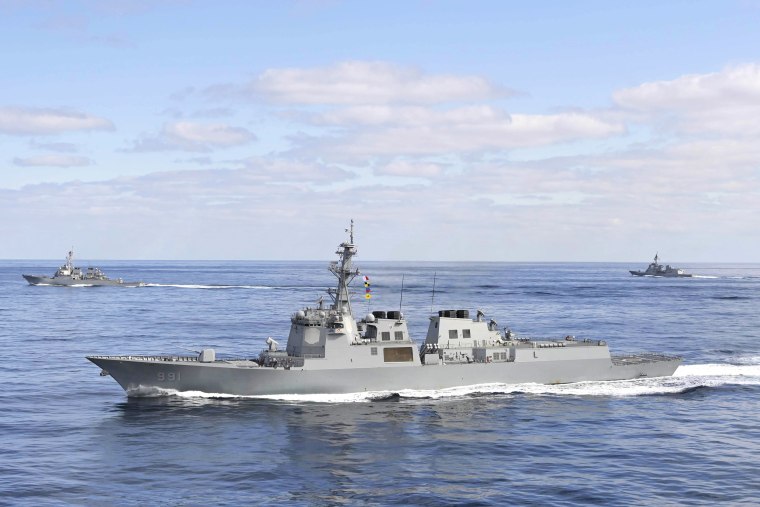WASHINGTON — The U.S., Japan and South Korea plan to announce groundbreaking steps to bolster mutual security ties at a summit this week in Maryland, including sharing intelligence about ballistic missile threats from North Korea and China and holding regular joint military exercises, senior Biden administration officials said.
The unprecedented moves reflect what U.S. officials and analysts say is a dramatic improvement in relations between Tokyo and Seoul after years of strained ties stemming from Japan’s colonial occupation of Korea. A shared concern over China’s aggressive actions in the region and North Korea’s growing missile arsenal has fueled a historic rapprochement that experts believe could usher in a new era for all three countries.
“This is a real breakthrough,” said Michael Auslin, a distinguished fellow at Stanford University’s Hoover Institution.
Friday’s summit, with President Joe Biden hosting Japanese Prime Minister Fumio Kishida and South Korean President Yoon Suk Yeol at the presidential retreat at Camp David, Maryland, marks the first standalone meeting among the three countries. Previous meetings have been held on the margins of large multilateral conferences. It is also the first time foreign leaders have visited Camp David since 2015.

Auslin said plans for the three countries to share real-time intelligence to defend against possible missile attacks should help foster confidence between Japan and South Korea.
“It builds trust because you’re sharing information,” he said. “That is what we have not had.”
The three countries are expected to set up a three-way hotline to allow the governments to communicate during a crisis, senior administration officials said. And they plan to issue a statement that addresses China’s vow to change the status of Taiwan.
“There’s a clear understanding amongst the three of us that we all have a fundamental interest in peace and stability across the Taiwan Strait,” a senior administration official said.
China claims Taiwan, a self-governed island, as part of its territory and has not ruled out the use of force to “unify” it with the mainland.
Chinese officials criticized the summit, saying it would fuel hostility instead of promoting peace.
“China has noticed some exclusionary groupings being assembled for the so-called ‘regional security’ only to intensify antagonism and undermine the strategic security of other countries,” Liu Pengyu, a spokesperson for the Chinese Embassy in Washington, said by email. “China firmly opposes such practices.”
State Department officials defended the Camp David meeting. “There is no reason to view this summit as a provocative or any kind of step or effort to incite tensions,” spokesperson Vedant Patel said.
Successive U.S. administrations have tried to encourage stronger defense ties between Japan and South Korea, but progress has proved elusive.
Biden administration officials believe they can succeed this time by establishing permanent initiatives that include regularly scheduled meetings about defense, diplomacy, technology and other areas. The goal is to establish long-term ties that last beyond the tenures of each country’s current leader.
“We have slipped before, and so we are doubling down on doing everything possible to build resilience, redundancy and capacity,” a senior administration official said.
As a candidate, Biden promised to strengthen alliances and partnerships to counter China. Administration officials said this week’s summit is part of that broader effort, which includes a new Australia-U.K.-U.S. defense pact; a “security dialogue” among India, Australia and Japan known as the Quad; and a new U.S. defense agreement with the Philippines.
Experts said the leaders of both Japan and South Korea showed political courage in pursuing closer relations.
South Korea and Japan have historically had a fraught relationship, stemming in part from Japan’s occupation of the peninsula from 1910 to 1945. An estimated 200,000 people — most of them South Koreans — were forced into sexual slavery in Japanese military-run brothels during World War II.
Relations plummeted in 2018 and 2019, when Tokyo alleged that a South Korean warship directed its fire-control radar at a Japanese Maritime Self-Defense Force aircraft. South Korea then accused a Japanese surveillance plane of conducting “provocative” flights over its naval ships.
The rising power of China has apparently reversed that dynamic. For the first time in decades, political leaders in Seoul and Tokyo appear ready to risk domestic criticism.
“What’s significant is that the threat from China is causing them to unite more, have more visits and otherwise work together with the United States to be able to take on China,” said Michael Allen, who served on the White House National Security Council in George W. Bush’s administration.
Allen said the display of unity in the three-way summit, if it proceeds as planned, could deliver a message to China and to the region. “The most tangible, most important thing, I think, will be the visual,” he said.

